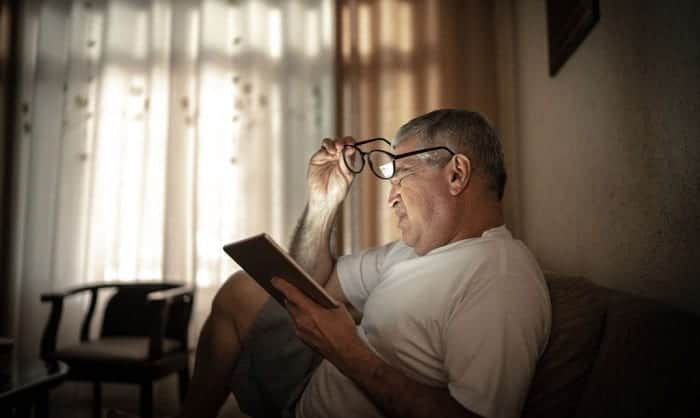Suppose you’ve worn your first pair of glasses for a few hours and you already feel irritated and dizzy. You might even wonder how people leave these glasses on for hours and hours every day. And just like that, you feel disheartened thinking about all the days ahead with this annoying companion.
But the good news is that those feelings are valid in the beginning, and everything will get better once you know how to get used to wearing glasses. After a while, you might not even notice the pair is there. Here’s how:
Table of Contents
Know That It is Normal to Feel Headaches with New Glasses
We have presbyopia or nearsightedness, and maybe other vision conditions, so after we get our prescription glasses, it is time to put them on. But be aware that there can be some issues at first. You can feel a little bit of a headache, which makes you dizzy and your temple aches. Some people even experience nausea.
Knowing it is a normal occurrence for everyone can put you at ease. The headache happens due to the change of Diopters. It is also due to the pressure from the eyewear frame, especially if it is a bit tight or heavy on your temples and noses. So make sure you purchase the one that fits well.
Also, you can expect an awkward feeling when putting on the pair for the first time. Having something sitting there on your nose, of course, will annoy you to some extent. But it will just take a few days for you to get used to the sensation; focus on working or doing other light tasks that distract yourself.
4 Tips to Get Used to Wearing Glasses
1. Wear Your New Glasses Consistently
It will be so tempting to take the glasses off, especially for a brand new pair rather than just a replacement of lenses. And this might lead to you reading and working without glasses. With that, it will take longer to get used to the piece and might even worsen your current eyesight.
So, make sure you put them on while reading, using electronic devices, or other activities requiring eye focus. When you rest, take them off, close your eyes, and maybe look up to the sky and green trees to relieve the tension. You can take more breaks than usual, but do not forget to put the glasses on once work begins.
2. Keep the Eyeglasses Spotless
Dirty spots that blur the lights entering our eyes will further irritate you. Hence, getting used to new glasses also involves keeping the pair clean all the time. This is a recommended tip by optometrists to lessen the dizziness on the first days.
To do so, we need to be geared with a cleaning kit that keeps the eyewear lenses spotless all the time. For quick cleaning at work, a piece of high-quality microfiber cloth will do. Make sure that you choose a soft one produced for cleaning glasses to avoid scratching the lens surfaces.
If you want to thoroughly get rid of smudges, oils of fingerprints, and other dirt on your glasses, you will need a suitable cleaning agent. In this case, an eyeglass spray cleaner is a good option, as it allows you to eliminate stubborn marks while enjoying other attributes such as fog-free and water resistance, etc.
Everyone should make cleaning glasses, both frame and lenses, a habit in the long term, not just for the adjusting period, because dirty eyewear makes us squint hard to see, thus worsening our vision.
3. Protect the New Pair of Glasses
If we want our eyes to get used to the feel of new glasses soon, we also have to make sure the piece is not distorted, scratched, or damaged along the process. Obviously, when the frame suffers from strong impact and bends awkwardly, it becomes challenging for us to feel comfortable wearing the piece.
Furthermore, minor spots appearing on the lenses will distract and annoy us and affect the correctness of the pair. So, it is best to keep your new glasses in a case when not in use.
And do not put it into huge bags with heavy tools and stuff lying on each other. Also, please avoid letting the glass lenses contact other concrete surfaces when you put the glasses down.
4. Do Exercise for the Eyes
When you are handling work with a high level of focus, and your eyes feel strained due to the prolonged staring, it is time for some exercises. Also, this is a good habit if you are going to wear glasses often from now on.
- Flexing your eyes is to strengthen your ocular muscles. You can do so by facing forward, then looking up and down without moving your head. Repeat it ten times. And look to your right then your left without moving your head. Now repeat the same action 10 times.
- Rapid blinking is another easy exercise to do for your eyes to relieve some of the strain from staring too hard into one place for hours. Do this by facing your gaze forward and blink every 5 seconds. You can keep doing this for 2 minutes.
- The following exercise is called focusing near and far, also beneficial for eye muscles. Just put your thumb right in front of your eyes, keeping it 10 inches away. And focus your eyes on another object 10 feet away from you.
Now, you can switch between your thumb and the chosen object, practicing near and far focusing for 2 minutes.
- When your eyes are tired from blinking and focusing, it is time to massage them a little.
First, close your eyes, then cover them with your hand. Put your fingers on your forehead so that your palm is resting on your cheekbones. You can also massage this area to relieve the eye stress for 2 minutes. Make sure to maintain a medium pressure in the process.
Go Visit Your Eye Doctor if the Irritation and Pain Get Serious
Usually, people spend 2 – 3 days getting used to wearing glasses. After the adjusting period, things go back to normal as they are familiar with the sensation. However, if after 3 days, your eyes are still strained and tired, causing you much headache and nausea, you must get checked.
The issue might be the incorrect Diopters or the glass frame size, and more. To find out the problem and get better, you must see your eye doctor and make necessary changes.
Conclusion
Getting used to glasses is a process that takes you three days or so; it should not be longer than that. Afterward, you might even feel attached to the helpful partner that makes you see the world a little bit better and clearer. If you are new to this experience, hopefully, our guide on how to get used to wearing glasses will make it easier for you.

Having worked in the field of personal protective equipment for over two decades, Andrew Carnegie is a specialist in the field.
At EDC, he strives to improve performance efficiency and promote workplace safety for EDC’s readers and customers. He also researches the most up-to-date equipment that has earned relevant accreditation for use in a wide range of industries and specialties.




